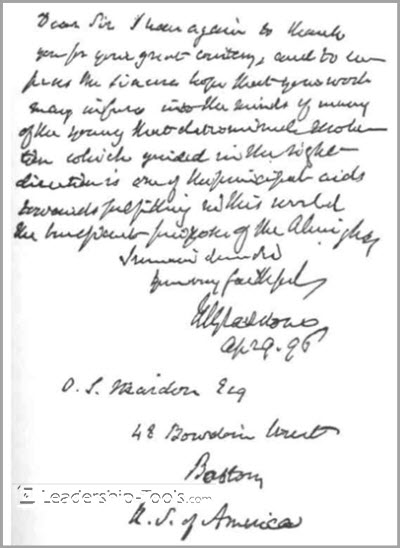- Home
- Self Growth Library
- Orison Swett Marden Chapter XVII
Orison Swett Marden Chapter XVII
Pushing To The Front
The Life Story of Orison Swett Marden Chapter XVII:
The pathway of literature is strewn with wrecked hopes, disappointed ambitions, broken lives. The story of the successful author is, with few exceptions, the same — constant work, repeated disappointments, tireless persistence in spite of failure.
In Doctor Marden's case, it required unusual courage to start in such a profession in middle life, with no further preparation than that which had been gained in the scant leisure of a crowded business career.
To make the venture after a series of financial disasters that left one penniless and in debt would seem to the practical minded, the man or woman without vision, little short of madness.
It was because he had vision, and also, perhaps, because he knew little of its difficulties, that Marden had the courage to burn his bridges behind him and make his venture in literature. When he bid Kearney a last good-bye, and, turning his face eastward, boarded a train for Boston, he did not know what lay before him.
Grasping in his hand his most treasured possession, a suitcase containing his manuscripts, he went forth into the Unknown.
When he arrived at the North End Station, his first concern was to find a cheap boarding place. Having been familiar with Boston from his college days, he had no difficulty in this; and, after establishing himself in a little room within his means, he threw himself with characteristic energy into his chosen work.
Then, a strange thing happened. Scarcely had he gotten started, when the owners of the Hotel del Coronado, the great beach resort at San Diego, California, telegraphed him five times, requesting him to go to see them with a view to becoming its manager.
The principal stockholders in the hotel, then said to be one of the finest in the world, were Claus Spreckels, the sugar magnate, and the Southern Pacific Railway. Acceptance of this offer would have resulted in restoration of his fortune. It was a severe test of the strength and sincerity of his purpose. On the one hand, there beckoned a position of responsibility in a field in which he was an expert; on the other, aspiration pointed toward a beautiful ideal that might easily fall short of attainment, with possible poverty being the end result.
But the die was cast. He had made his decision once and for all. No temptation was great enough or strong enough to make him turn back. With Faith as his guide, he would go forward, no matter what that course might entail. He closed the incident by wiring his refusal to consider the offer and settled down to his work with renewed vigor.
In a short time he had completed the rewriting of "Pushing to the Front" and had also finished the manuscript of a second book, "Architects of Fate." It will be remembered that all his original notes and manuscripts had been destroyed in the Midway Hotel fire in Kearney.
The story of the publication of his "dream book" made a fitting climax to its romantic history. The idea had been born in the mind of a poor, ill-clad, hungry boy, some thirty years before. Germinating while he was struggling for an education, it had drawn to itself material from all sources.
Beginning to bud in his young manhood, the idea later flowered into expression, only to be swept out of apparent being by a terrible accident. Slowly, painfully, it had been restored to life, and at length, when the boy had become a middle-aged man, it was ready for presentation to the world.
"The world makes way for a determined man."
- O.S. Marden
But who was going to present it? This was the question the Doctor asked when he had finished the rewriting of his manuscript. How it was answered, is told my Doctor Marden himself.
"I had not published anything before. I was not known at all as a writer, and had no firsthand knowledge of publishers or their ways. Expecting that I would be compelled to run the gauntlet with them for many months before my book would be accepted, if it should be accepted at all, I made three copies of the manuscript, and submitted one to each of three different Boston publishers.
"To my amazement all three, after a first reading, wanted to bring out the book, although the firm that ultimately published it, Houghton, Mifflin & Company, had formerly declined to consider it. The manuscript was submitted to them on October 28, 1894, and was rejected, without examination, on the ground that July 25th was their latest date for considering the publication of a book of the nature of 'Pushing to the Front,' as it should be listed in their fall catalogue and mentioned in their holiday advertising, both of which were then in print and press.
"Horace E. Scudder, however, the firm's literary editor, offered to take one chapter home, that night, to see if its matter and manner were adapted to the trade of any other house he knew. The next day he called for the remaining chapters. After examining them carefully, he advised Houghton and Mifflin to publish the book, not with the expectation of selling many that year, but for the sake of future trade.
The book was accepted November 11th, rushed through the editorial room, the press and the bindery, with day and night squads of workmen, and was on the market the first of December. It was advertised but little beyond inserting descriptive slips in other books sold by the firm; yet so strongly was it praised by reviewers, and so cordially was it recommended to friends by purchasers that over twelve editions went through the press the first year."
The book was a "best seller" from the day of its publication. It has since established itself as an inspirational classic and is as popular among all classes today as when it first took the public by storm thirty years ago.
Yet one prominent man told the author, before the book was published, that he might possibly sell five hundred copies, but that there was really no demand for such a book. The author himself was so doubtful of its success that, even after he had signed a contract with the publishers, Houghton, Mifflin & Company, he went to them and asked that he be allowed to take back the manuscript and rewrite it!
Mr. Scudder, however, who was then editor of the Atlantic Monthly, as well as literary editor of the firm, advised him not to touch it. But, although he followed this advice, the amateur author was not satisfied and made up his mind that he would never again give a publisher such a poor book!
"My experience with 'Pushing to the Front' convinces me," he said, "that no author can really gauge his own writings. I would have been glad to sell the manuscript outright for a thousand dollars! Later, I did sell the German rights to the book for a song, never dreaming that it would become so popular."
"Resolve that whatever you do, you will bring the whole man to it; that you will fling the whole weight of your being into it."
- Orison Swett Marden
Orison Swett Marden Chapter XVII , continued...
Two hundred and fifty editions of "Pushing to the Front" have so far been published in this country alone. It is known and read in practically every country in the world. Of the fifty or more books and booklets afterward published by its author, not one has been more popular or more far-reaching in its influence than this, his first literary effort, of which he thought so poorly.
Doctor Marden held to the belief that the name of the book — "Pushing to the Front, or Success Under Difficulties," — had a great deal to do with its success. This name was suggested by a Boston barber, a negro born into slavery.
The author made the barber's acquaintance when he first went to Boston, and became deeply interested in him when he found that, like himself, he was struggling hard to get an education. He encouraged his ambition and helped him in every possible way, lending him books and assisting him with his studies, while he himself was working his way through Boston University and Harvard.
Although the title of the book is a happy one, and very suggestive, it probably would have succeeded under almost any other; for, after all, it is not the title or the cover, but what is inside the cover, that sells a book — makes it a success or a failure.
Inside the covers of "Pushing to the Front" is inspiring tales which thrill the reader with the very breath of triumphant life. The book is a veritable romance of success. It stirs the imagination with story after story of men and women who, although handicapped and challenged beyond the average, have yet nevertheless won clear triumphs in every field of human effort.
It shows how great geniuses, even as men and women of average ability have done, have realized their ideals and attained their highest ambition, by precisely the same means, — through the exercise of indomitable will, by concentration of purpose, and patient, persistent, steady effort along the various lines of endeavor. It multiplies instances of men who, unaided, have risen from the humblest ranks to the highest positions of honor and service.
'Pushing To The Front' tells the life stories of great men, showing how they started, often in abject poverty, how they struggled in the face of discouragement and repeated failure, and how they finally triumphed, having done splendid things for the world and having won undying fame and the gratitude of mankind.
It is, in short, a human epic, an epitome of the life struggle which is perpetually going on about us. It pictures the continuous forward march of the race, particularly of those indomitable souls whom no obstacles can deter — heroes and heroines of the ages, — leaders who leave their footprints upon the world. Above all else, it shows the sources of success, reveals to men their hidden strength — that godlike power, latent in every human being, which in every age has enabled man to perform the "impossible."
Bishop John H. Vincent, founder of the Chautauqua educational movement, after reading the book, wrote to Doctor Marden, asking him for an appointment. The Bishop wanted him to consider a plan for associating himself with the Chautauqua movement. This would mean devoting his entire time to summer school work, writing exclusively for it, and giving his attention to other phases of its activities.
"Pushing To The Front, multiplies instances of men who, unaided, have risen from the humblest ranks to the highest positions of honor and service."
Flattering as the proposition was, it was not surprising that an author whose first book had brought him fame over night should decide against it. He felt that it would be unwise, at the beginning of his literary career, to tie himself down to one field, or in any other way restrict his liberty of action. It would have been unfortunate if he had made any other decision; for, as it developed, his field became the world.
Letters began to pour in on the author from high and low, rich and poor. John Wanamaker who, like himself, had begun life as a poor boy, wrote: "Had I seen such a book as 'Pushing to the Front' when I first started towards mercantile life, I would have been willing — if it had been necessary, — to go without at least one meal a day to have enough money to buy your book."
England's great Prime Minister, William E. Gladstone, so highly esteemed it that he promised to write an introduction to the book for the English publishers. Unfortunately, he died before the work was done. The Following is a facsimile of a letter he wrote Doctor Marden:

"Pushing to the Front" has been translated into some twenty-five languages. It is used as a textbook in the schools of many European countries. Signor Alexander Rossi, an Italian senator and noted educator, said that he regarded it as a "civilization builder" and wrote a pamphlet strongly recommending that its reading be made obligatory in the schools of Italy. Danish publishers brought out twenty-two editions of the book within ten months.
The Danish Prime Minister wrote an article in praise of it, and a famous Admiral, one of the most prominent men in Denmark, wrote an introduction to it for the publishers.
Both President McKinley and President Roosevelt gave it the stamp of their approval. Business men put it in libraries for employees and manufacturers have bought thousands of copies for distribution throughout the United States. Governor Holcomb, of Nebraska, who was one of the guests staying at the Midway Hotel when the building was burned, was deeply interested in the book, and, when he came East, called on the author in New York.
Thousands of men and women in the most diverse vocations have written him in the same spirit as did Colonel William G. Kable, head of the Staunton Military Academy, Staunton, Virginia, when he penned these words:
"I attribute most of the credit for the growth of this wonderful
institution to that marvelous book, 'Pushing to the Front,' which I
always have on my desk. Is it any wonder, therefore, that I regard you
in the light of a good angel?"
Before Colonel Kable read "Pushing to the Front," the Military Academy was so run down that it had but eighteen students. Through the inspiration of the book, he succeeded in raising its student roll to full capacity, three hundred and fifty. Colonel Thomas H. Russell, Colonel Kable's successor as President of Staunton Military Academy, wrote in a similar vein in September, 1922. There is room for only a short extract from his letter:
My Dear Dr. Marden:
I am quite familiar with the very vital part that the spirit of "Pushing to the Front" had in the redemption of Staunton Military Academy from what was almost a state of dissolution. I joined Colonel Kable just three years after his return from New York, in response to the appeal of his noble old father, who was getting well up in years and was a victim of circumstances over which he had no control.
It was Colonel Kable who first gave me a copy of "Pushing to the Front," or, rather, loaned me the copy that had been given to him by you. It was likewise a great inspiration to me. I shall never forget what you wrote on the fly-leaf, "The world makes way for a determined man."
That one glorious thought has been a great staff to me in many crises.
Nearly one million copies have been sold in Japan alone. "I have 'Pushing to the Front' issued by four houses there," says Arthur W. Brown. "I also had it from three others, but gave them away, — and think I have seen it from three more, but am not quite sure, — all with notes in Japanese, and, I think, no two just alike.
A Japanese whom I knew in the old Embassy days under Lanman called on me in Providence, and told of its great vogue in his country. I expressed surprise. 'Why,' said he, 'among ourselves we often call it the Japanese Bible.' At this I expressed still greater surprise. 'Didn't you know,' he asked, 'that it was that book which gave us the courage to resist the Russian encroachments?'"
Perhaps the most far-reaching thing accomplished by the success of the book, the implanting of a great new idea in the mind of the author. What this idea was and what came of it makes a more remarkable story than that of "Pushing to the Front" itself.







